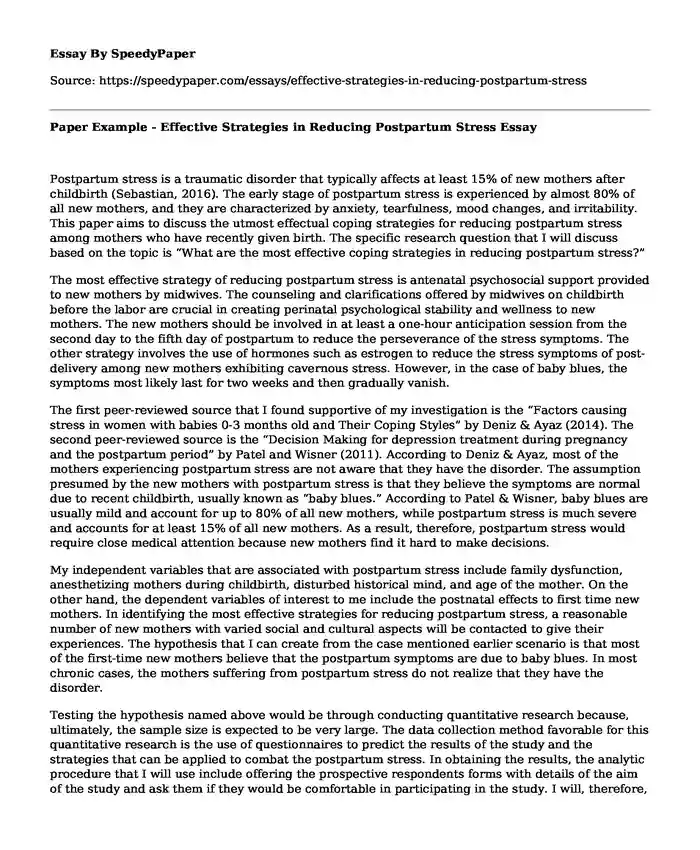
| Essay type: | Proposal essays |
| Categories: | Pregnancy Mental health Post traumatic stress disorder Essays by wordcount |
| Pages: | 3 |
| Wordcount: | 655 words |
Postpartum stress is a traumatic disorder that typically affects at least 15% of new mothers after childbirth (Sebastian, 2016). The early stage of postpartum stress is experienced by almost 80% of all new mothers, and they are characterized by anxiety, tearfulness, mood changes, and irritability. This paper aims to discuss the utmost effectual coping strategies for reducing postpartum stress among mothers who have recently given birth. The specific research question that I will discuss based on the topic is “What are the most effective coping strategies in reducing postpartum stress?”
The most effective strategy of reducing postpartum stress is antenatal psychosocial support provided to new mothers by midwives. The counseling and clarifications offered by midwives on childbirth before the labor are crucial in creating perinatal psychological stability and wellness to new mothers. The new mothers should be involved in at least a one-hour anticipation session from the second day to the fifth day of postpartum to reduce the perseverance of the stress symptoms. The other strategy involves the use of hormones such as estrogen to reduce the stress symptoms of post-delivery among new mothers exhibiting cavernous stress. However, in the case of baby blues, the symptoms most likely last for two weeks and then gradually vanish.
The first peer-reviewed source that I found supportive of my investigation is the “Factors causing stress in women with babies 0-3 months old and Their Coping Styles” by Deniz & Ayaz (2014). The second peer-reviewed source is the “Decision Making for depression treatment during pregnancy and the postpartum period” by Patel and Wisner (2011). According to Deniz & Ayaz, most of the mothers experiencing postpartum stress are not aware that they have the disorder. The assumption presumed by the new mothers with postpartum stress is that they believe the symptoms are normal due to recent childbirth, usually known as “baby blues.” According to Patel & Wisner, baby blues are usually mild and account for up to 80% of all new mothers, while postpartum stress is much severe and accounts for at least 15% of all new mothers. As a result, therefore, postpartum stress would require close medical attention because new mothers find it hard to make decisions.
My independent variables that are associated with postpartum stress include family dysfunction, anesthetizing mothers during childbirth, disturbed historical mind, and age of the mother. On the other hand, the dependent variables of interest to me include the postnatal effects to first time new mothers. In identifying the most effective strategies for reducing postpartum stress, a reasonable number of new mothers with varied social and cultural aspects will be contacted to give their experiences. The hypothesis that I can create from the case mentioned earlier scenario is that most of the first-time new mothers believe that the postpartum symptoms are due to baby blues. In most chronic cases, the mothers suffering from postpartum stress do not realize that they have the disorder.
Testing the hypothesis named above would be through conducting quantitative research because, ultimately, the sample size is expected to be very large. The data collection method favorable for this quantitative research is the use of questionnaires to predict the results of the study and the strategies that can be applied to combat the postpartum stress. In obtaining the results, the analytic procedure that I will use include offering the prospective respondents forms with details of the aim of the study and ask them if they would be comfortable in participating in the study. I will, therefore, ask the participants willing to take part in the study to give me the time they will be available to work with them at their convenience.
References
Deniz, C., & Ayaz, S. (2014). Factors causing stress in women with babies 0-3 months old and their coping styles. Journal of Psychiatric and Mental Health Nursing, 21(7), 587-593.
Patel, S., & Wisner, K. (2011). Decision-making for depression treatment during pregnancy and the postpartum period. Journal of Depression and Anxiety, 28(7), 589-595.
Cite this page
Paper Example - Effective Strategies in Reducing Postpartum Stress. (2023, Aug 23). Retrieved from https://speedypaper.net/essays/effective-strategies-in-reducing-postpartum-stress
Request Removal
If you are the original author of this essay and no longer wish to have it published on the SpeedyPaper website, please click below to request its removal:
- Free Essay Example on a Gay Marriage Issue
- Free Essay with Change Management Research
- Paper Sample about Antigone, An Annotated Bibliography
- Essay Sample Describing the Organizational Structure of the Teamsters
- Chandra Manning Book Review, Free Essay for Everyone
- Essay Sample on Impacts of Reality Television on Society
- Paper Example: Free Enterprise Policies in America During the Covid-19 Pandemic
Popular categories




